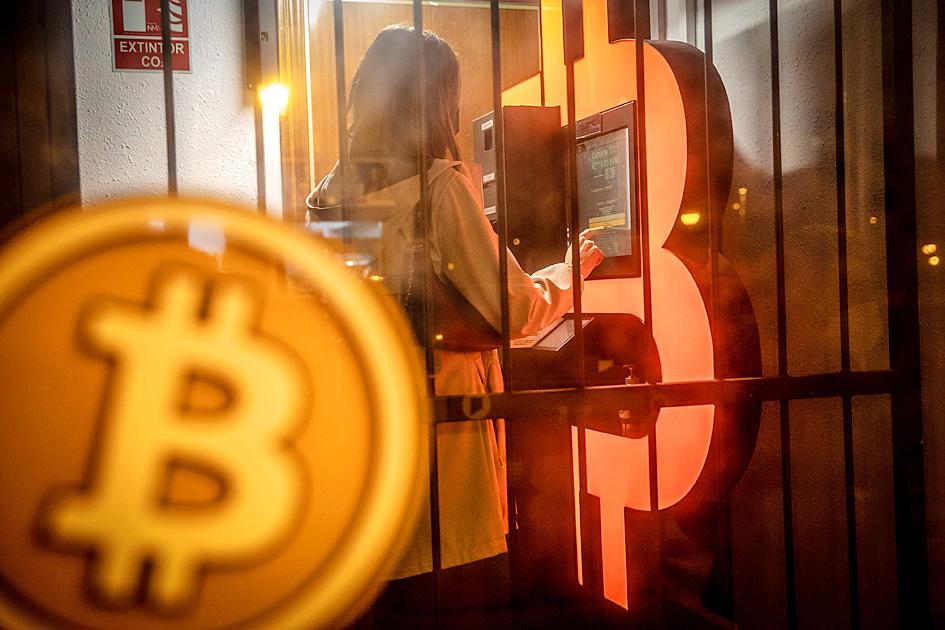Providers of automated teller machines (ATMs) that allow people to purchase cryptocurrencies with cash have to comply with anti-money laundering (AML) regulations and conduct know-your-customer (KYC) practices, or face a penalty, the Financial Supervisory Commission (FSC) said yesterday.
The FSC made the remarks following a nearly month-long investigation after Chinese Nationalist Party (KMT) Legislator Lai Shyh-bao (賴士葆) on Dec. 23 raised questions about the machines’ operations during a meeting of the legislature’s Finance Committee.
The commission found that there are at least 24 bitcoin ATMs in Taiwan, which are operated by different companies for different purposes, Banking Bureau Chief Secretary Phil Tong (童政彰) said.

Photo: Bloomberg
One of the operators was among the 16 virtual-asset service providers that have reported to the commission about their compliance with AML regulations and practices, while the others are not regulated, he said.
“Some providers of those ATMs use the machines not as a tool to boost trade, but for marketing campaigns. They assign employees to tell people how to open an account at the companies’ digital platform to trade virtual coins online,” Tong said.
“However, we found that some ATMs allow consumers to trade cryptocurrencies without [the company] following KYC practices. Such providers might have contravened AML regulations,” he said.
The commission will ask the providers to work on AML compliance and failing that, they might be fined NT$500,000 (US$18,092) or more, he said.
In related news, the commission yesterday tweaked its regulations on security token offerings (STOs), but did not raise the fundraising limit of NT$30 million, despite calls from interested parties.
Companies wishing to raise more funds would still have to apply to run an experiment in the regulatory sandbox, the commission said.
“Companies that aim to raise more than NT$30 million are not small and they can raise funds via regular channels, such as an initial public offering,” Securities and Futures Bureau Deputy Director-General Kuo Chia-chun (郭佳君) said by telephone.
“As STO is a new fundraising mechanism and bears more risks, it is appropriate that STOs apply only to small companies,” Kuo said.
No company has filed for an STO since the regulations took effect in January 2020, data from the commission showed.
The commission has no plans to regulate non-fungible tokens (NFT) for the time being, as it does not consider the tokens securities, even though they have gained popularity in Taiwan lately.
“Although people can raise funds by launching NFTs, as they can by issuing bonds or shares, and tokens can be traded like bonds or shares, they are still different from the two main types of securities,” Kuo said.
NFTs are not issued to fund an operational project or business, but are issued as a digital certification of works of art, so the commission considers it more like a real product than securities, she said.
The commission would investigate any suspicious fundraising activity if investors file a report about being scammed, she added.

Sweeping policy changes under US Secretary of Health and Human Services Robert F. Kennedy Jr are having a chilling effect on vaccine makers as anti-vaccine rhetoric has turned into concrete changes in inoculation schedules and recommendations, investors and executives said. The administration of US President Donald Trump has in the past year upended vaccine recommendations, with the country last month ending its longstanding guidance that all children receive inoculations against flu, hepatitis A and other diseases. The unprecedented changes have led to diminished vaccine usage, hurt the investment case for some biotechs, and created a drag that would likely dent revenues and

Global semiconductor stocks advanced yesterday, as comments by Nvidia Corp chief executive officer Jensen Huang (黃仁勳) at Davos, Switzerland, helped reinforce investor enthusiasm for artificial intelligence (AI). Samsung Electronics Co gained as much as 5 percent to an all-time high, helping drive South Korea’s benchmark KOSPI above 5,000 for the first time. That came after the Philadelphia Semiconductor Index rose more than 3 percent to a fresh record on Wednesday, with a boost from Nvidia. The gains came amid broad risk-on trade after US President Donald Trump withdrew his threat of tariffs on some European nations over backing for Greenland. Huang further

CULPRITS: Factors that affected the slip included falling global crude oil prices, wait-and-see consumer attitudes due to US tariffs and a different Lunar New Year holiday schedule Taiwan’s retail sales ended a nine-year growth streak last year, slipping 0.2 percent from a year earlier as uncertainty over US tariff policies affected demand for durable goods, data released on Friday by the Ministry of Economic Affairs showed. Last year’s retail sales totaled NT$4.84 trillion (US$153.27 billion), down about NT$9.5 billion, or 0.2 percent, from 2024. Despite the decline, the figure was still the second-highest annual sales total on record. Ministry statistics department deputy head Chen Yu-fang (陳玉芳) said sales of cars, motorcycles and related products, which accounted for 17.4 percent of total retail rales last year, fell NT$68.1 billion, or

MediaTek Inc (聯發科) shares yesterday notched their best two-day rally on record, as investors flock to the Taiwanese chip designer on excitement over its tie-up with Google. The Taipei-listed stock jumped 8.59 percent, capping a two-session surge of 19 percent and closing at a fresh all-time high of NT$1,770. That extended a two-month rally on growing awareness of MediaTek’s work on Google’s tensor processing units (TPUs), which are chips used in artificial intelligence (AI) applications. It also highlights how fund managers faced with single-stock limits on their holding of market titan Taiwan Semiconductor Manufacturing Co (TSMC, 台積電) are diversifying into other AI-related firms.